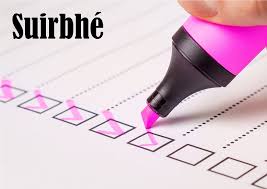A Survey is badly needed!
I read an interesting article on 'tuarisc.ie' recently written by Máire Ní Fhinneadha and it got me thinking. She wrote about data from the 2022 census and the number of people who speak Irish every day in the Gaeltacht in the Language Planning Areas. Máire was surprised that the experts didn't have much to say and especially that they didn't give us any advice based on those results. She said that 43% in her own area in the Gaeltacht claimed to be daily speakers, but she then made a good point that it was most likely the heads of families - adults - who filled in the census form, although the most important information about speaking the language at a young age. Máire did her own informal research in Cois Farraige.
Patrúin úsáide na teanga
Máire identified three patterns in relation to the use of the language in her own area, in my opinion:
Máire saw something that was both funny and sad. A young woman passed by with her son and they had a small conversation about the pleasure boat that was out on the road. The woman said to the boy - 'look at the boat'. 'Why are you speaking Irish Mammy?' says the wee lad!
Analysis
According to the census, the number of people in the Gaeltacht who speak Irish has risen, from 63,664 in 2016 to 65,156 in 2022 (an increase of 1,492 / +2.3%) at a time when, however, the number of people in the Gaeltacht who speak Irish has fallen every day from 20,586 in 2016 to 20,261 in 2022 (fall 325 / -1.6%). Although there is a positive story in that there is an increase in the number of people who speak Irish, it is a cause for concern that the community that speaks Irish is falling. But when you combine the aforementioned usage patterns with the census figures, it becomes clear that the situation is even worse. When the heads of households who speak Irish every day filled out the census form, it is more likely than not that they described that everyone in the family speaks Irish every day. Therefore, there is every chance that the number of people in the Gaeltacht who speak Irish as their main language every day is considerably less than 20,261. Not only that, but there is a good chance that most young people do not speak Irish as their main language either, even if they speak Irish every day, and that is not a good thing, if it is true. This is what Julian de Spáinn, Secretary General of the Irish Language League, said on the subject:
"...strong, continuous and ambitious support from the State is urgently needed to turn the tide and achieve a significant boost in the use of the Irish language. There are plenty of things that need to be done to achieve that vision and to sustain the growth that is needed; it is necessary to finance the Growth Plan, Investment Plan for the Irish and the Gaeltacht 2024-29, which has been agreed by more than 115 Irish and Gaeltacht groups to ensure significant long-term investment; there is a need for a national housing policy for the Gaeltacht; there is a need for an education policy from early childhood education to third level, and beyond." Although I agree with him, I think that more information is needed to develop a more targeted and effective approach.
Recommendations
It would be very useful to carry out a survey to collect more personal data from the people who speak Irish every day, according to the census. I would ask for details such as: your age, your main language at home and outside, what percentage of Irish and English do you speak daily, do you speak a mixture of Irish and English? Do you speak Irish with your own generation and English outside of that (or vice versa)?
We would learn a lot from a survey like that and with the new information we would receive, we would be able to formulate better plans to achieve a significant boost in the use of the Irish language.






